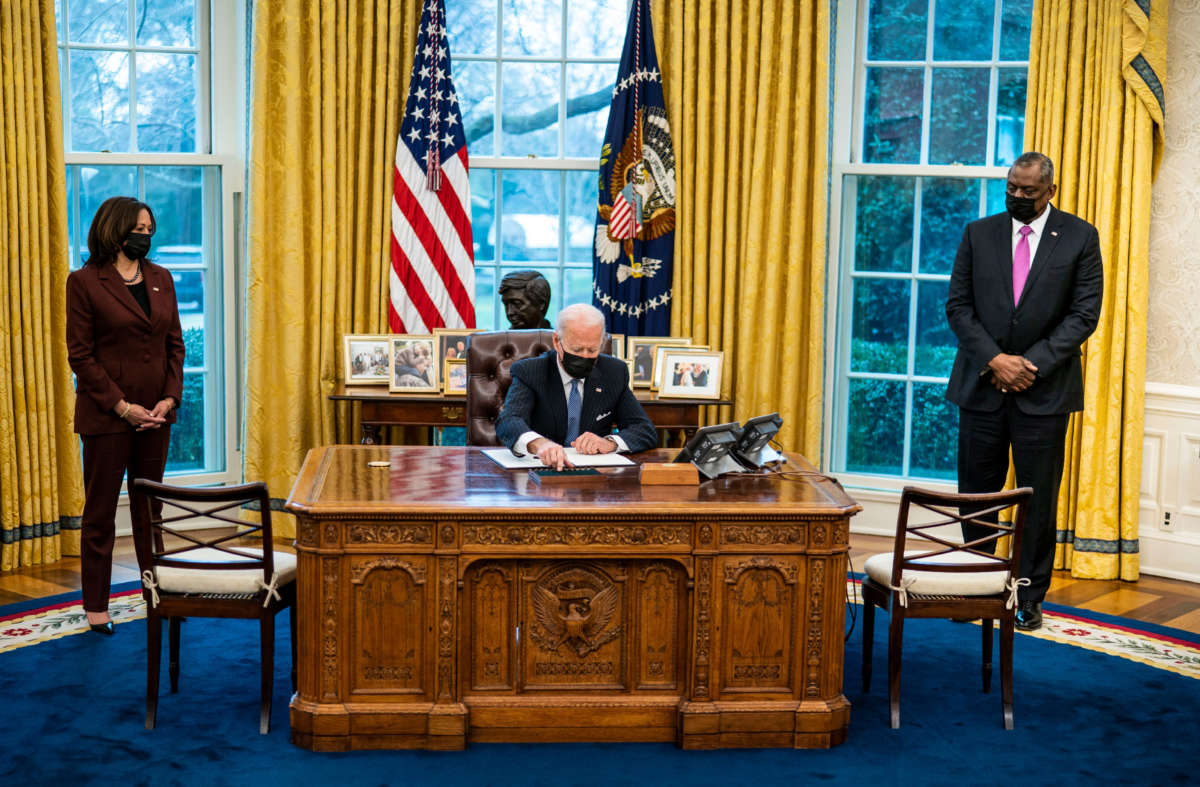President Joe Biden issued an executive order on Monday lifting former President Donald Trump’s ban on transgender troops from being able to serve in the United States armed forces.
The move rescinds Trump’s previous order, which itself sought to reverse an Obama-era policy that had allowed transgender individuals to serve openly in the military.
“It’s simple: America is safer when everyone qualified to serve can do so openly and with pride,” Biden said in a tweet after the order was announced.
Trump’s original ban was announced in a series of tweets in July 2017. The former president had claimed at the time that he had been in “consultation with [his] generals and military experts” before he made the decision, but the Pentagon was reportedly taken by surprise by the sudden announcement made by Trump that day.
Trump’s ban has been wildly unpopular, with seven in ten Americans in favor of letting transgender individuals serve, according to a Gallup poll conducted in 2019. Even among cisgender military members, two-thirds of those surveyed in a 2020 University of California, Los Angeles poll said they supported an inclusive policy versus Trump’s discriminatory ban.
In addition to rescinding the ban imposed by Trump, Biden’s executive order will also require corrections to the records of military personnel who were harmed by the former president’s restrictive and discriminatory order. According to a fact sheet produced by the White House, the new order will start the process of “identification and examination of the records of service members who have been involuntarily separated, discharged, or denied reenlistment or continuation of service on the basis of gender identity.”
Per figures produced by the National Center for Transgender Equality and the Transgender American Veterans Association, the order from Biden will affect as many as 15,000 service members.
Although many are lauding the lifting of the ban as a civil rights victory, some have questioned whether seeking such “wins” through the military might have negative or unintended consequences for the LGBTQ community. Matthew Byrne, a queer graduate student in sociology at the University of California, Riverside, who studies the intersections of gender, sexuality and militarism, pointed out in an article for Truthout in February 2019 that,
Though advocating for the civil right of military enlistment may seem like a solution to inequality and violence against LGBT people, it is a Pyrrhic victory that is damaging in the long run. The military must not be our singular path to liberation. More important than protecting LGBT people’s civil right to enlist is ensuring everyone’s human right to not need to enlist.
“Government decisions on this topic mainly reflect whether the state sees trans folks as instrumental to the project of hegemony or as an affront to ‘American values,'” Sydney Roberts, a queer, nonbinary labor rights activist, said in an article for Truthout after Trump’s ban was initially announced in 2017.
Trump is silencing political dissent. We appeal for your support.
Progressive nonprofits are the latest target caught in Trump’s crosshairs. With the aim of eliminating political opposition, Trump and his sycophants are working to curb government funding, constrain private foundations, and even cut tax-exempt status from organizations he dislikes.
We’re concerned, because Truthout is not immune to such bad-faith attacks.
We can only resist Trump’s attacks by cultivating a strong base of support. The right-wing mediasphere is funded comfortably by billionaire owners and venture capitalist philanthropists. At Truthout, we have you.
Our fundraising campaign is over, but we fell a bit short and still need your help. Please take a meaningful action in the fight against authoritarianism: make a one-time or monthly donation to Truthout. If you have the means, please dig deep.
